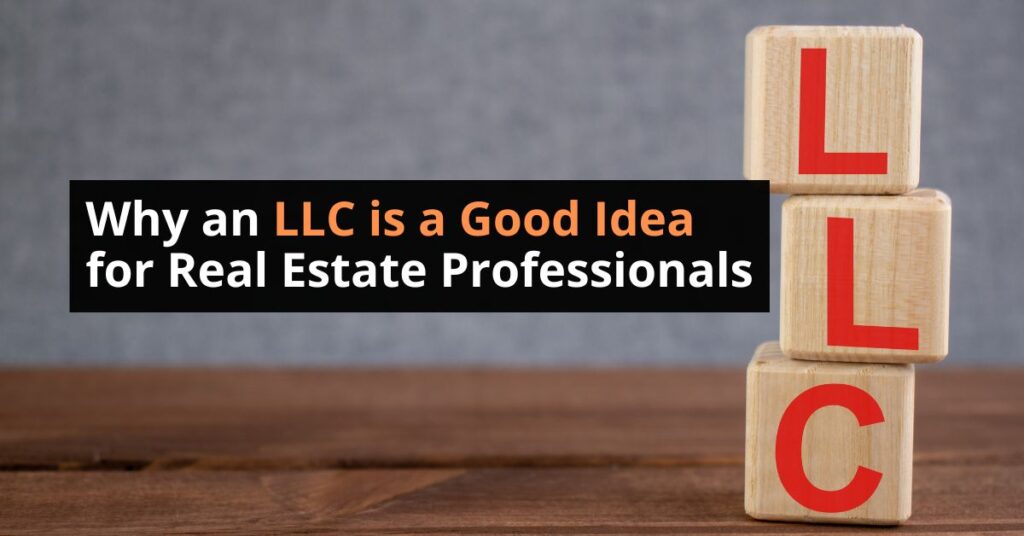Being a real estate professional gives you the power to be your own boss, and have the freedom to run your business as you see fit. It’s one of the main draws to the industry. And when you take the plunge it can be exciting, but it is equally important to protect yourself. That’s where the decision of whether to be a sole proprietor, an LLC or other entity comes into play. But don’t worry, it isn’t as confusing as it sounds. The biggest difference is that one better protects your personal assets which is important, and the other lets you save money while being less complicated to manage.
Here’s how each one can impact your business and protect you, so you can be on the right path to manage your business without having to worry about those “what if” situations. One thing to keep in mind is that there are always going to be nuances, and they change state by state, so it is important to take this information to a licensed real estate attorney and to your accountant so you can figure out how to handle your current assets and your liabilities once you decide on your business type. What applies to your friends and peers likely does not apply to your situation.
Sole Proprietor
When you’re a sole proprietor, you don’t have to separate out business taxes or file annual reports, and in some cases may not need an EIN (employer tax ID number). It is also just you running and managing the company so you have “less people stresses” to deal with. It’s a lot simpler from a business standpoint, but riskier too. If someone sues you like a tenant, a contractor, etc… you assume all liability and they can come after your personal assets. This is because your business and your personal property are looked at as one in the same. You could lose your house, your car, and they can go after your bank accounts. That’s why it gets risky for you and your personal life.
Real estate professionals get sued regularly whether or not they did something wrong. It doesn’t matter if you’re an agent, a wholesaler, investor, or a landlord. If you’re curious about why, here’s the top reasons real estate professionals get sued. You cannot control how your clients, or the other side of the deal are going to respond now or in the future. So if you want to protect your personal assets, do not continue as a sole proprietor. If you are not worried about personal liability, then this could be a good strategy for you.
LLC
Forming an LLC for a real estate business is easy, and almost always a good idea. There’s no telling what can happen from a client not disclosing something and the buyer coming back to sue you later, or a surprise negligence lawsuit. You cannot control what your clients or the clients on the other side will do, but you can protect your personal assets. Unlike a sole proprietorship, when you form an LLC your personal assets are more protected, and your risk is only as great as the money you put into the organization.
With that said, anything you personally guaranteed is at risk. If you’re a real estate investor, or an agent who also owns properties, or if you signed a mortgage to buy properties and something happens to the LLC, you are still on the hook for those personal guarantees. You’ll also want to look into buying insurance policies to protect the LLC and to protect yourself. If you do decide to form a real estate LLC, the process is very easy and you can find multiple companies that will help for a minimal fee.
The process to form a real estate LLC is simple:
- Choose a company name and make sure it isn’t trademarked.
- You also want to make sure that your company name follows local naming guidelines and laws. Here’s the corporate naming guidelines if you’re based in Washington, D.C.
- Make sure the company name is not already taken. You can do this by looking on your state’s website. Here’s the one for D.C. since we used D.C. in the example above.
- Assign a registered agent if you do not want to be your own.
- It is a good idea to have a third party as a registered agent if you work from home as the address and information will be in the public domain.
- Now you file the articles of organization with the state you’re incorporating in.
- The next step is to create an operating agreement which outlines the responsibilities and ownership rights of the owners. You can find examples online, but make sure to have a licensed real estate attorney check them if you’re not using a reputable LLC formation company with experience in real estate.
- Now get your EIN which is your business tax ID for the IRS.
- It’s a unique number so the IRS knows how much taxes you’re paying and will be used when you hire contractors and get paid.
There’s other things you’ll want to have a licensed professional look at. One is if you already own properties. Transferring them to your LLC can be tricky from both a tax and legal standpoint. And the same goes with any debts like loans or if you’re consolidating multiple debts into one. But don’t let it scare you, these are common place for experienced real estate attorneys and CPAs. Find one that is reputable, licensed, and that you trust, then you should be in good hands.
Forming an LLC as a real estate professional is a good idea, and in most cases less risky than being a sole proprietor. If you have questions about this, give us a call, or contact our friends at ARK Attorneys.

